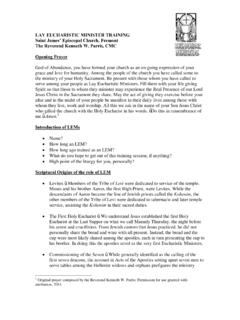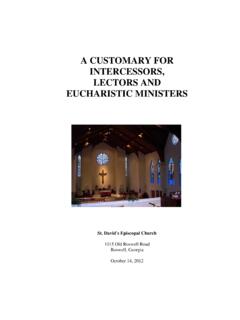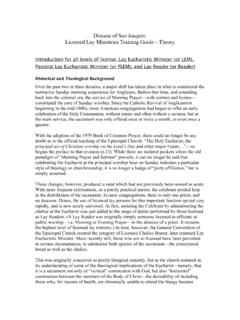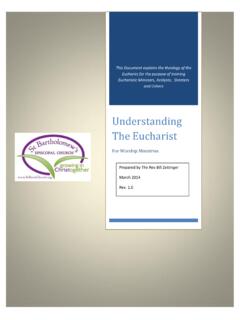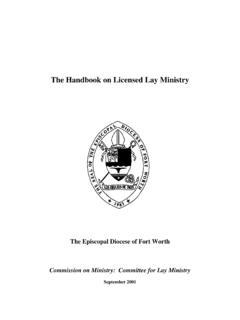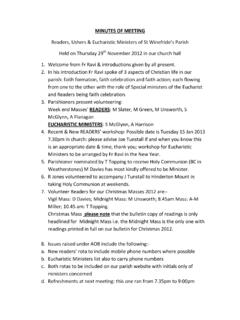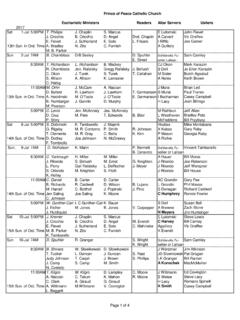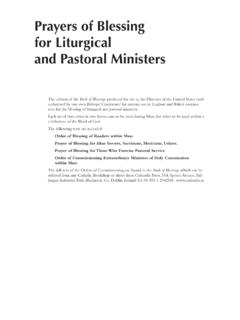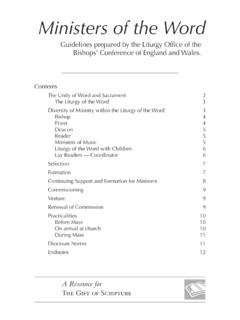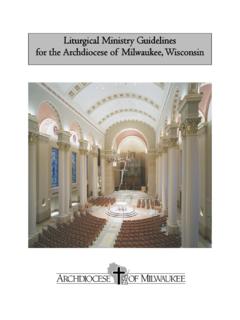Transcription of GUIDELINES FOR EXTRAORDINARY MINISTERS OF HOLY …
1 GUIDELINES for EXTRAORDINARY MINISTERS of holy communion Page 1 Revised: June 2006 INTRODUCTION The Constitution on the Sacred Liturgy (CSL), the first document promulgated by the Second Vatican Council, reaffirmed that Christ is always present in the Church, especially in its liturgical celebrations. Christ is present when the Church prays and sings, in the proclamation of the Word, and in the person of the minister . Finally, the Council stressed that Christ is especially present under the eucharistic elements (CSL, no. 7). For the Catholic, the liturgical gathering is of paramount importance. It is fitting then, that our liturgical celebrations are described as: the summit toward which the activity of the Church is directed; at the same time it is the fount from which all the Church s power flows (CSL, no.)
2 10). While the heart of the celebration of Mass is the Eucharistic Prayer, the consummation of the liturgy is found in holy communion . In the gathering, in the breaking of the bread, in the eating and the drinking the faithful are joined together as members of Christ s mystical Body, sharing the one life of the Spirit. In the great sacrament of the altar, they are joined to Christ Jesus and to one another (Norms for the Distribution and Reception of holy communion Under Both Kinds in the Dioceses of the United States of America [NDRHC], no. 5). It is not surprising then, that in order to promote fuller participation in the holy Eucharist, the Second Vatican Council called for the faithful present at each Mass to communicate not only by spiritual desire but also by sacramental communion (General Instruction of the Roman Missal 2002 [GIRM 2002], no.
3 13). If a large number of the faithful are present, the presider will frequently need assistance in distributing communion so that the communion Rite is not unduly long. He will regularly need this assistance when communion is given under both kinds, the form of communion that more clearly signifies the eucharistic banquet (GIRM 2002, nos. 281-282). To that end, deacons and concelebrating priests assist as ordinary MINISTERS of communion . Instituted acolytes, where they are available, can assist as auxiliary MINISTERS . However, EXTRAORDINARY MINISTERS of holy communion (EMHC), either formally commissioned for a given period or temporarily deputed by the presider, will frequently give this assistance (GIRM 2002, nos.
4 162 & and NDRHC, no. 28). GUIDELINES FOR EXTRAORDINARY MINISTERS OF holy communion Diocese of St. Petersburg GUIDELINES for EXTRAORDINARY MINISTERS of holy communion Page 2 These individuals serve Christ who is present in the assembly by ministering his Body and Blood to their sisters and brothers. They also serve the Body of Christ by taking communion to those members who, through sickness, old age, or other causes are prevented from taking part in the Mass. In accord with a most ancient tradition, it is most appropriate for communion to be taken directly from the Sunday Eucharist to the sick and those unable to leave their homes. Genuine ministry is about humble service. The model for all ministry is Christ the Lord who came to serve, not to be served.
5 His command to love one another (cf. John 13:43) was modeled throughout his life and ministry. The EMHC must put aside personal agendas and needs, prejudices and judgements in order to serve the community and give faithful testimony to Christ s presence in the Eucharist. DIOCESAN GUIDELINES The General Instruction of the Roman Missal indicates that the diocesan Bishop is to establish GUIDELINES for EXTRAORDINARY MINISTERS of holy communion . In addition, the Bishop is to set forth norms regarding the distribution of communion under both kinds for his own diocese (GIRM 2002, no. 283). For the last several years, the Bishop of the Diocese of St. Petersburg has requested that all parishes within the diocese offer communion under both kinds at each of the Sunday Masses.
6 Where possible, communion is also to be offered under both kinds at Masses celebrated during the week. Of course, the Bishop calls for each parish community to offer the requisite education and formation regarding the Eucharist and distribution of communion under both kinds (NDRHC, & 28). These GUIDELINES , then, apply the Church laws and principles regarding EMHC and the distribution of communion to the practices carried out in parishes throughout the Diocese of St. Petersburg. SELECTION OF CANDIDATES Those selected to be EXTRAORDINARY MINISTERS of holy communion are to be fully initiated members of the community, both male and female, of sufficient age and maturity, and of diverse ethnic backgrounds. Because the parish may also call on them to take communion to the sick and homebound, those persons selected for this ministry should possess the maturity necessary to minister in these sometimes difficult situations.
7 Criteria are necessary for the selection, formation, and evaluation of MINISTERS . For those who will serve in the public ministry of the Church, faith must be supported by visible signs. To this end, the following qualifications might be employed to assist the pastoral team in discerning who could take on this ministry: basic human wholeness, GUIDELINES for EXTRAORDINARY MINISTERS of holy communion Page 3 manifestation of the theological virtues (faith, hope and charity), manifestation of the cardinal virtues (prudence, justice, fortitude and temperance), a positive sense of Church, a willingness to be formed in the ministry of the Church, and an abiding reverence for the presence of Christ in the eucharistic bread and wine and in the assembly of the faithful.
8 Finally, MINISTERS who bring communion to the sick or homebound are to comply with the prescribed parish policies and the policies of the Diocese of St. Petersburg regarding volunteer forms and background checks. These requirements have been put into place for the safety and protection of both the sick person as well as the minister . TRAINING AND ONGOING FORMATION Preparation for this ministry includes: 1. Formal instruction through the Office of Worship which includes sessions on ministry, Eucharist, paschal mystery and general GUIDELINES . 2. Instructions from the EMHC s respective parish about local customs and responsibilities, and the opportunity to pray and share with others in the ministry. Each parish should have in place a continuous training program for those who serve in this ministry.
9 That training should include: education, formation and support (NDRHC, no. 28). In addition, opportunities for reflection on the Eucharist, its place in the minister s life, and this particular ministry should take place at least once a year or perhaps seasonally ( , Advent and/or Lent). The Diocese of St. Petersburg also offers continuing formational experiences for the EMHC on a regular basis. LENGTH OF SERVICE Since ministry is a call both from God and the community in which it is exercised, it is appropriate that choices of ministry and renewal of the term of service be mutually agreed upon by the individual and the parish. Parishes should commission EXTRAORDINARY MINISTERS of holy communion for a specific period, perhaps two years.
10 This will allow both the EMHC and the parish community to benefit from this ministry. It also allows the MINISTERS the opportunity to evaluate their involvement and/or to change to another ministry at the end of their term. Re-certification and re-commissioning of EMHC beyond that period is dependent upon parish policy. As with all liturgical ministries, it is best for the individual and the parish if a person serves in only one ministry at any given liturgy. To encourage the involvement of a variety of persons in this ministry, parishes may wish to limit a person s service to one liturgical ministry at any given time. GUIDELINES for EXTRAORDINARY MINISTERS of holy communion Page 4 PROCEDURES A. Reverence and Attire EXTRAORDINARY MINISTERS of holy communion should show a reverence for the Eucharist.
